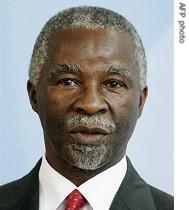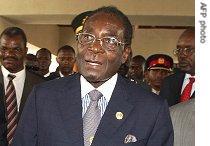2007年VOA标准英语-Zimbabweans Show Little Optimism Ahead of SADC
搜索关注在线英语听力室公众号:tingroom,领取免费英语资料大礼包。
(单词翻译)
By Peta ThornycroftSouthern Africa
13 August 2007
South African President Thabo Mbeki's anticipated report to the Southern African Development Community summit on Thursday is unlikely to reveal significant progress toward resolving the crisis in Zimbabwe. The report, on the mediation1 between President Robert Mugabe's ruling ZANU-PF and the opposition2 Movement for Democratic Change, began after a special summit on Zimbabwe in Tanzania five months ago. Peta Thornycroft reports for VOA.
 |
| Thabo Mbeki (July 2006 file photo) |
The South Africans were appointed by SADC in March to facilitate talks between the ruling ZANU-PF and the opposition MDC leading to elections next March.
So far there have been only two substantive3 sessions between President Mugabe's negotiators and the two secretary-generals of the divided MDC.
At first the two sides engaged on a draft constitution they negotiated in secret in Harare in 2004.
However, after Mr. Mugabe said last month he would never agree to a new constitution ahead of the elections in six months, the two sides have been discussing reforms of electoral laws.
Any reforms could be facilitated through another amendment4 to Zimbabwe's constitution.
 |
| Robert Mugabe (file photo) |
As it stands now, President Mugabe would be the ZANU-PF candidate for the presidential election due next March, and time is running out for any serious changes to Zimbabwe's electoral laws and processes, which the opposition claims were created to assist ZANU-PF at the polls.
President Mugabe told cheering crowds at a rally Monday to commemorate8 Zimbabwe's liberation war heroes, that the recent price cuts which saw retail9 prices cut below cost of manufacture, would remain.
He said nothing would stop Zimbabwe "from expressing our sovereign right to govern ourselves as we deem fit."
The Zimbabwean president described current hyperinflation as a "brazen10 conspiracy11" and blamed former colonial power Britain, for the unprecedented12 economic crisis, which he said was "temporary."
Last week the U.S. Famine Early Warning Systems Network, or Fewsnet, issued an "emergency" report on Zimbabwe's food situation.
In addition to a poor agricultural season and the need for massive emergency feeding programs, Fewsnet commented on the empty shelves in Zimbabwe's supermarkets.
"The formal market can no longer maintain a regular supply of basic goods," Fewsnet said.
Meanwhile all SADC countries surrounding landlocked Zimbabwe report an upsurge of people fleeing the economic crisis.
The South African government says it has repatriated13 about 100,000 illegal Zimbabweans so far this year.
 收听单词发音
收听单词发音 




